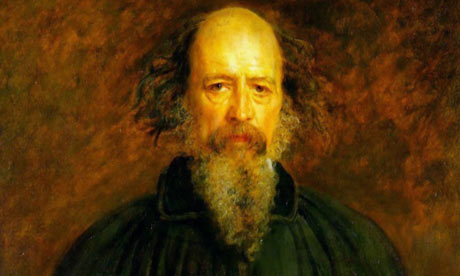Although never fond of church going and heedless of doctrinal orthodoxy, Tennyson was profoundly religious, stating: “Two things I have always been firmly convinced of—God—and that death will not end my existence.”
Early and late, Tennyson’s theme was mortal beauty. In The Princess (1847), when he was scarcely forty, he set it to an enchanting music.
The splendor falls on castle walls
And snowy summits old in story;
The long light shakes across the lakes,
And the wild cataract leaps in glory.
Blow, bugle, blow, set the wild echoes flying,
Blow, bugle; answer, echoes, dying, dying, dying.
Later, as an older man, on the Isle of Wight, where he would live with his wife and two sons in his sequestered Farringford, he summoned the theme to honor his old friend and neighbor, Sir John Simeon, who was also a good friend of Cardinal Newman.
Nightingales sang in his woods:
The Master was far away:
Nightingales warbled and sang
Of a passion that lasts but a day;
Still in the house in his coffin the Prince of courtesy lay.
The historian James Anthony Froude spoke for many of his generation when he confessed how “Spiritually [Tennyson] lives in all our minds (in mine he has lived for nearly forty years) in forms imperishable as diamonds which time and change have no power over.”
The literary critic George Saintsbury corroborated this when he observed how “no age of poetry can be called the age of one man with such critical accuracy as the later Nineteenth Century is, with us, the Age of Tennyson.”
What makes John Batchelor’s new life of the poet so admirable is that while it recreates the Victorian Tennyson with meticulous care, it also attends to those aspects of the poet’s work that transcend his historical context.
There are not many good biographies of Tennyson—Robert Bernard Martin’s Tennyson: The Unquiet Heart (1980) is an exception—but Batchelor’s life can now be accounted the best. Written with great learning and unusual grace, it will spur new interest in a poet who has much to say to our own contemporaries. Continue reading
Sources
- Article written by Edward Short, the author of Newman and his Contemporaries and Newman and his Family, in The Catholic World Report
- Image: Voices
